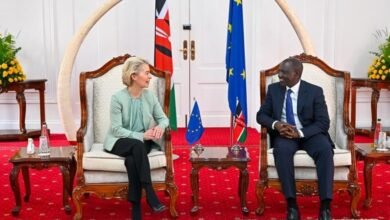
The United Nations’ top court, the International Court of Justice (ICJ) is deciding today October 12, 2021 on a long-running border dispute between Somalia and Kenya.
This comes even as President Uhuru Kenyatta has maintained that his government will not cede even an inch of its soil to anyone or any state during his tour of Boni Forest in July, this year.
“As a peace-loving country, we are not the type to be attacked or threatened or even allow an inch of our country to end up in the hands of other people. We are ready to defend ourselves just as we have defended peace in other countries.”
The panel of 15 judges led by United States judge Joan Donoghue decision will have potentially far-reaching consequences for bilateral ties and access to natural resources in the oil and gas rich region.
The case was brought by Somalia more than seven years ago after Kenya granted exploration permits to Italian energy giant ENI but Somalia has opposed the move.
At the heart of the dispute lies the direction that the joint maritime boundary should follow from the point where the land frontiers meet on the coast.
Kenya has already accused the UN’s court of bias and announced that it will not recognise the court’s binding decision.
The dispute covers an area of 100,000 square kilometers believed to be rich in oil and gas deposits in the Indian Ocean.
The disputed triangular area extends to parts of Mombasa and Lamu, from where Kenyan fishermen earn their livelihood.
Also Read:
- Rise in global oil price spells doom for Kenyan motorists
- Kenya among beneficiaries of debt relief by IMF
- Kenya requires Ksh.6.8 trillion to realise green economy in 10 years
Kenya withdrew from the set date of hearing which was March 15, 2021 after having requested for the fourth time an extension of the hearing.
While affirming Kenya’s withdrawal from the ICJ, Foreign Affairs Principal Secretary Macharia Kamau said Friday the impending judgment was the culmination of a flawed process.
“For these reasons, and in addition to withdrawing its participation from the current case, Kenya, on the 24th September, 2021, also joined many other members of the United Nations in withdrawing its recognition of the Court’s compulsory jurisdiction. As a sovereign nation, Kenya shall no longer be subjected to an international court or tribunal without its express consent,” said Kamau.
The PS said the decision by Somalia to file a case against Kenya and ICJ move to accept it demonstrates new strategies countries are using to invade other territories.
“It is important for every Kenyan to understand that threats to territorial integrity are now no longer necessarily overt and direct. The filing of a case against Kenya at the Court, and the Court’s assumption of jurisdiction where it had none, are demonstrative of new tactics of using pseudo-judicial processes to undermine territorial integrity,” the PS said.
Kamau added that whatever the decision, Tuesday’s judgement will have profound security, political, social and economic ramifications in the region and beyond.
He further said that the decision will be unfortunate in a region that is already struggling with terrorism, instability and conflict.
“The Government of Kenya recognizes and has consistently indicated as much, that the Judgement of the Court – whichever way – will have profound security, political, social and economic ramifications in the region and beyond. This will, undoubtedly, be unfortunate in a region that is already under the torment of terrorism, instability and conflict.”
He however urged Kenyans to remain calm saying the government was seized of the matter.
The court ruling will be delivered at 3 p.m.





